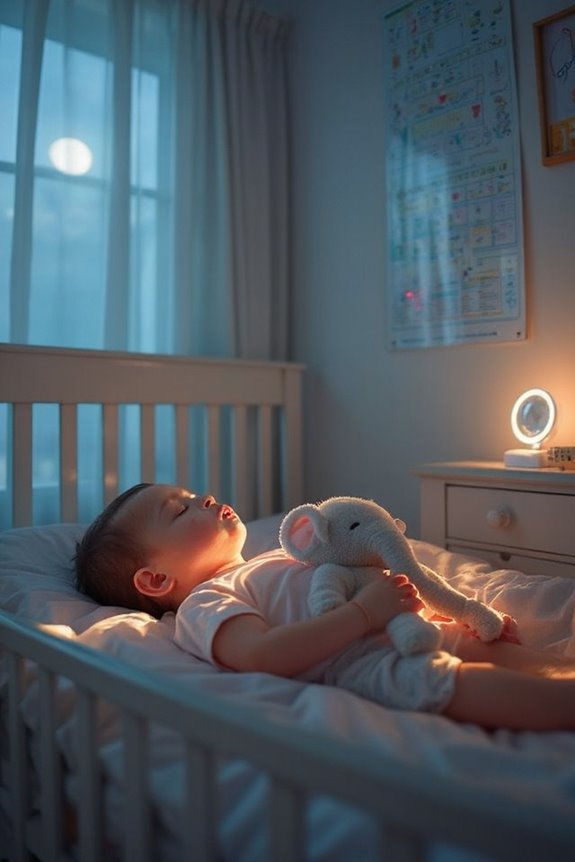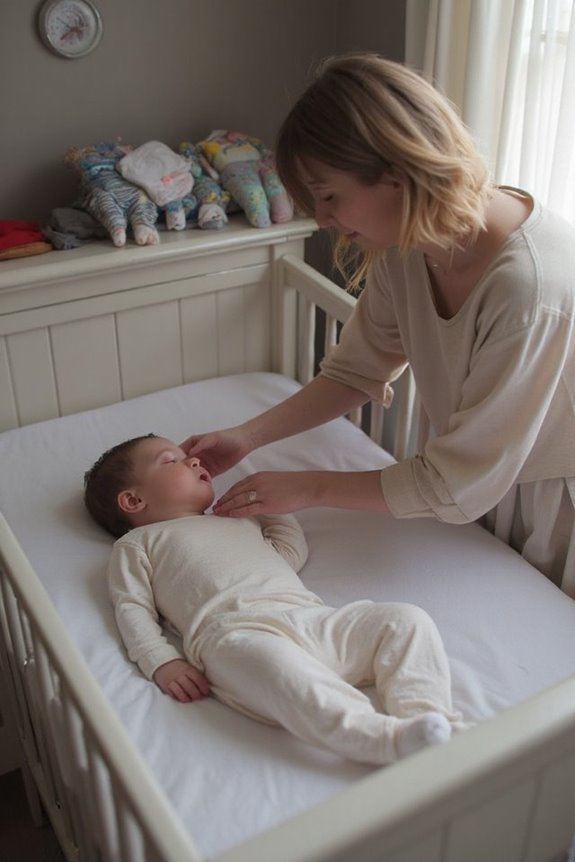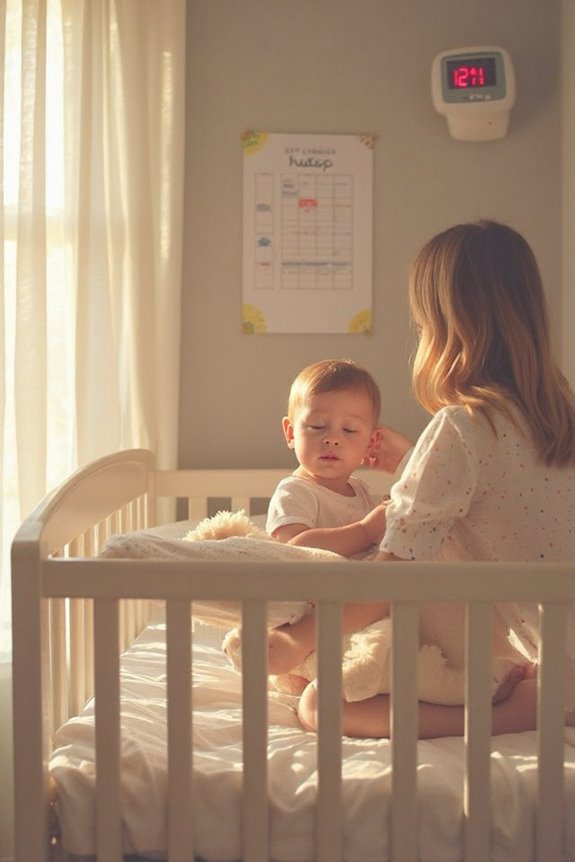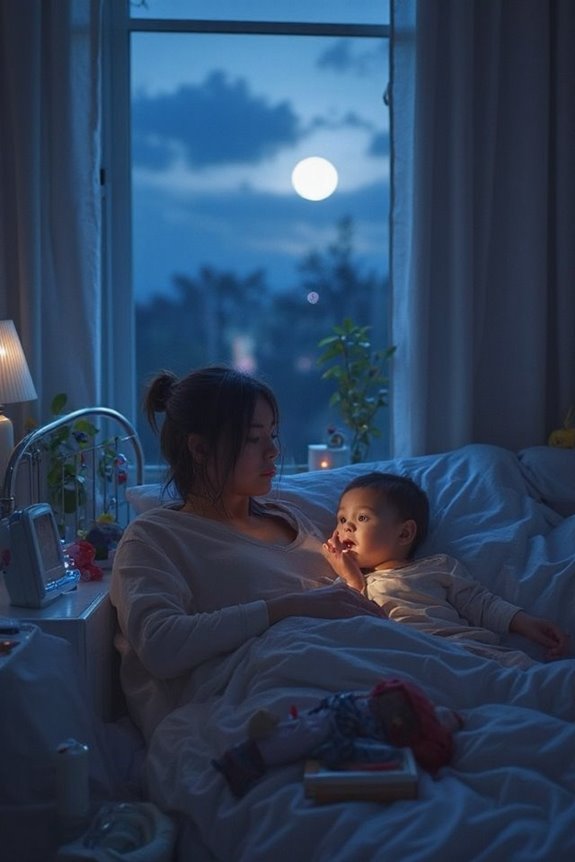Babies often cry during sleep due to normal sleep cycle changes that occur every 50-60 minutes. These brief awakenings are usually self-resolved. Other common causes include physical discomfort (hunger, wet diapers, temperature issues), overtiredness that disrupts sleep quality, and processing of developmental milestones. Your baby’s cries may also reflect their developing attachment to you. Understanding these patterns will help you determine when intervention is necessary and when your baby will settle independently.
Key Takeaways
- Sleep cycle transitions trigger brief awakenings with crying that babies often resolve without fully waking up.
- Physical discomfort from hunger, wet diapers, temperature issues, or digestive problems commonly causes sleep crying.
- Overtiredness produces stress hormones that disrupt sleep quality and lead to more frequent crying episodes.
- Processing developmental milestones and new skills during sleep can trigger crying without complete awakening.
- Crying during sleep is often a form of communication related to developing attachment security between infant and caregiver.
Sleep Cycle Transitions and Brief Awakenings
Three distinct phases make up a baby’s sleep cycle, and they’re quite different from our adult patterns. While adults typically complete a sleep cycle in 90 minutes, infants cycle through every 50-60 minutes, moving between:
- Active (REM) sleep: Features rapid eye movement, irregular breathing
- Change phases: Brief periods between sleep states
- Quiet (non-REM) sleep: Characterized by regular breathing and minimal movement
During these changes, you may notice your baby exhibiting normal sleep behavior such as:
- Making small sounds or brief cries
- Twitching or stretching
- Irregular breathing patterns
These brief awakenings are typically self-resolved as your baby cycles back to sleep. Most babies experience these change phases multiple times nightly, which explains why they sometimes cry briefly without fully waking.
Overtiredness and Its Effect on Sleep Quality
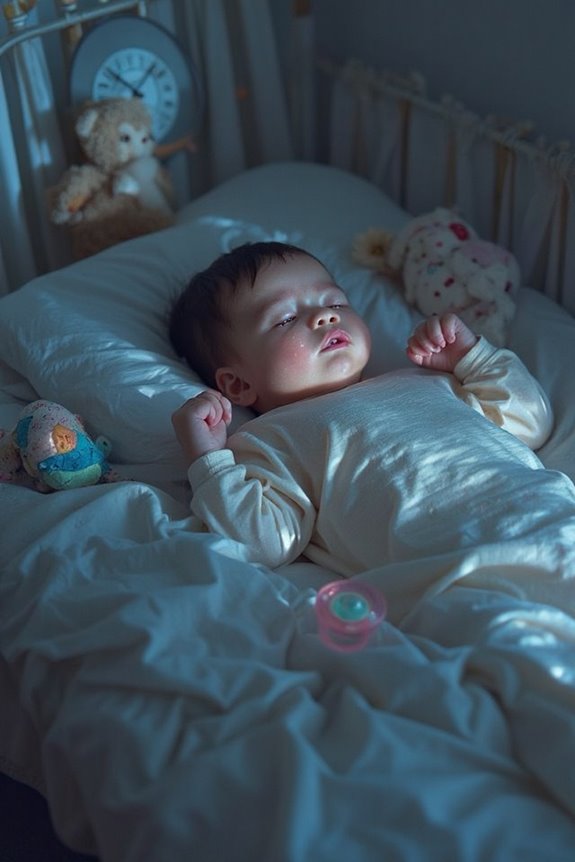
While many parents assume crying during sleep indicates discomfort, overtiredness often plays a crucial role in disrupting your baby’s sleep patterns. When babies miss their ideal sleep window, stress hormones like cortisol and adrenaline flood their system, making it harder to fall and stay asleep.
Key overtiredness signs include:
- Increased fussiness and resistance to sleep
- Short naps and frequent night wakings
- Meltdowns before bedtime
- Waking up screaming
This state considerably impacts sleep quality by:
- Reducing deep NREM sleep phases
- Triggering early morning wakings
- Creating a cycle of sleep debt
I’ve found that establishing consistent sleep schedules based on age-appropriate wake windows helps prevent this cycle. When babies get enough rest throughout the day, their nighttime sleep naturally improves.
Physical Discomfort During Rest
Although babies can’t communicate verbally, physical discomfort remains one of the primary reasons they cry during sleep. When your little one fusses during rest, they may be expressing basic needs that require attention.
Common causes include:
- Hunger cues – Whimpering or crying may signal it’s time for feeding
- Wet diapers – Regular diaper changes prevent skin irritation that disturbs sleep
- Temperature issues – Being too hot or cold can wake babies
- Digestive discomfort – Gas, reflux, or constipation often causes sleep disturbances
Pay attention to patterns in your baby’s sleep crying. If they settle after feeding or diaper changes, the cause was likely physical discomfort. For persistent crying despite addressing basic needs, consult your pediatrician to rule out underlying health conditions.
Developmental Milestones and Sleep Patterns
As babies grow and develop through their first year, they experience dramatic changes in their sleep patterns that directly affect when and why they cry during sleep.
Infants’ sleep cycles differ considerably from adults:
- Newborns lack established circadian rhythms until 10-12 weeks
- Sleep cycles last only 30-60 minutes (versus 90-120 minutes for adults)
- Babies shift frequently between REM and non-REM sleep
These sleep pattern changes coincide with developmental milestones that can temporarily disrupt rest. When your baby learns to roll over, sit up, or crawl, their brain actively processes these new skills even during sleep. This cognitive processing often triggers crying episodes without fully waking.
Psychological Factors Affecting Infant Sleep
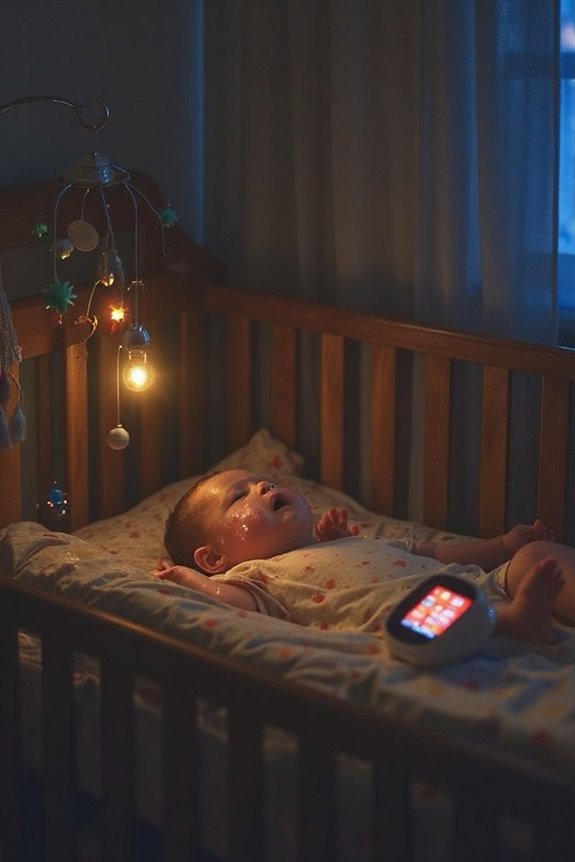
Beyond physical discomfort, a baby’s cries during sleep often reveal complex psychological dynamics at work. These nighttime vocalizations reflect developing attachment security between infant and caregiver.
Research shows that parental responsiveness plays a significant role in how babies learn emotional regulation. When parents respond appropriately to sleep-time cries:
- Infants develop healthy trust development patterns
- Stress management skills begin forming even in these early months
- The foundation for secure attachment is strengthened
Different parenting styles impact how effectively babies learn to self-soothe. Parents who balance attentiveness with allowing appropriate self-soothing opportunities tend to have infants who develop more effective sleep patterns.
Remember: responding to your baby’s cries doesn’t “spoil” them—it builds the security they need for healthy psychological development.
Environmental Influences on Baby Sleep
While your baby sleeps, the surrounding environment plays an essential role in determining both the quality and duration of their rest. Research shows that environmental factors can account for up to 66% of nighttime sleep patterns and 57% of daytime sleep duration.
Family routines greatly impact how well your little one sleeps. Consider these key influences:
- Regular bedtimes help maintain consistent sleep patterns
- Light exposure in the bedroom affects sleep quality
- Family dynamics and stress levels can disrupt sleep
- Socioeconomic conditions may influence sleep environment
As your child ages, they’ll naturally decrease their sleep time, largely due to environmental changes rather than genetic factors. By identifying specific environmental determinants affecting your baby’s sleep, you can create targeted interventions to improve their rest quality.
Effective Strategies for Soothing Nighttime Crying
Understanding your baby’s sleep environment is just the first step—knowing how to respond when they cry during the night is equally important. When your little one fusses during sleep, try these proven soothing techniques:
- Physical comfort: Hold them close, pat their back gently, or try swaddling infants under two months
- Sensory calming: Introduce white noise, soft music, or reduce stimulation by dimming lights
- Movement: Rock them gently, use a vibrating seat, or wear them in a sling
- Environment control: Maintain comfortable temperature and minimize disruptions
Establishing a consistent nighttime routine signals to your baby that it’s time to sleep. This might include a warm bath, quiet time, and gentle physical contact.
If crying persists despite trying these approaches, consult your pediatrician to rule out underlying issues.
Frequently Asked Questions
Can a Baby’s Sleep Crying Indicate Future Sleep Disorders?
Like whispers of tomorrow, I believe sleep crying can indeed forecast future sleep disorders. I’ve observed that disrupted sleep patterns during infancy, particularly when they persist beyond expected developmental milestones, may signal potential long-term issues.
How Does Maternal Diet Affect a Baby’s Sleep Crying?
While some moms believe my maternal nutrition affects my baby’s sleep crying, there’s limited scientific evidence. What I eat might influence breastmilk composition, but its direct impact on infant sleep cycles remains unclear.
Do Crying Patterns Differ Between Breastfed and Formula-Fed Babies?
I’ve seen a million crying babies, and yes, patterns differ markedly! Formula-fed babies show more evening crying clusters and peak at 7 weeks, while breastfeeding benefits include generally longer sleep durations despite more frequent wakings and formula preferences.
Can Babies Have Nightmares That Cause Them to Cry?
I believe babies likely don’t experience true nightmares as their brains aren’t developed enough. What parents observe is probably disruption in their sleep cycle rather than nightmare triggers. Their crying has simpler causes.
Is Sleep Crying Related to Daytime Personality Development?
Like threads weaving a tapestry, I believe sleep crying is connected to daytime personality development. It’s an early form of emotional expression that influences sleep development and how babies learn to process feelings when awake.

